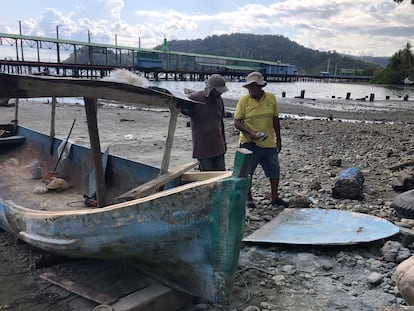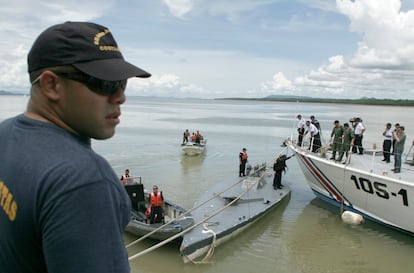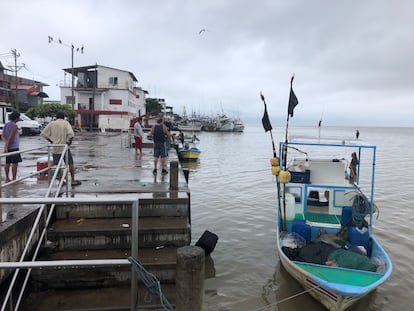Fishing, sustainability, and cocaine: Is Costa Rica reversing course on its ‘blue agenda’?
The territorial waters of the Central American country, renowned as a leader in environmental protection, are the focus of an increasingly heated conflict involving conservationists, fishermen and drug traffickers

On the night of November 3, 2018, a US maritime patrol plane spotted a suspicious vessel 50 nautical miles southwest of Costa Rica, in an area of the Pacific Ocean often used to transport cocaine. Acting on the surveillance intelligence, a US Coast Guard cutter approached the vessel’s coordinates and, after a high-speed pursuit, managed to shoot out the boat’s motors and apprehend the crew, along with 600 kilos of narcotics. Among those arrested were four Colombians and two Costa Rican fishermen, who had lost their jobs after the shrimping company that employed many of the area’s residents shut down operations following a 2013 constitutional ruling that banned trawling in Costa Rican waters.
The ship’s captain, a seasoned mariner, lived in the neighborhood of Fray Casiano, one of the most dangerous in Puntarenas, the country’s main port city on the Pacific coast. He had promised his family he would do one last job for the “señores,” and then he would retire. But his plan was cut short. It was no use trying to throw the bundles of white powder into the sea. Everything had already been recorded by the surveillance plane. Four months later, the six men pleaded guilty to charges of possession and international transportation of illicit drugs, and each received a sentence of roughly nine years.
Incarcerated in the Puntarenas prison – hot and stinking of garbage, surrounded by pools of stagnant, festering water – the captain has now served half of his sentence, and his family has spent most of the money he was able to earn before his arrest at sea. If there is a bright side, it is that he can enjoy the company of his fellow fishermen, who, like him, were forced to turn to crime when they could no longer make a living at sea. “This place is full of guys like that, who had to abandon their families and who will probably go right back to doing bad things when they get out, because what else do they have?” says Miguel Sánchez, a lawyer from Puntarenas who works as a teacher in the prison.
Costa Rica’s fishermen know the sea and the region’s coasts better than anyone, but now many of them are locked up in Puntarenas. Betraying its own name, Costa Rica (which means “rich coast” in Spanish) has left many of its seafaring citizens out to dry. And despite the country’s international reputation for promoting an environmental “blue agenda” to protect marine and coastal ecosystems, in recent months, with the arrival of a new government, it appears that the nation’s ecological commitments are only as strong as the wealth they can generate.

Security, conservation and productivity are the three main areas of often competing interest, posing a major dilemma for a country that has less than 20 square miles of land surface, but ten times that amount of territorial waters. The most extensive volcanic mountain range in Costa Rica is not the jungle-covered peaks photographed millions of times by tourists, but the massive, submarine range known as the Cordillera del Coco, of which nearly 500 miles traverses Costa Rican waters. Everyone, at least in Costa Rica, knows that the country shares land borders with Nicaragua to the north and Panama to the south, but few people know that the country shares maritime borders with countries as far away as Ecuador and Colombia. Many Costa Ricans are still coming to terms with the fact that this ostensibly tiny country is responsible for the immense task of stewarding 3.5% of the world’s marine biodiversity.
“The country still hasn’t developed a formula to adequately manage this enormous resource,” says Marco Quesada, a Costa Rican marine biologist and the director of Conservation International’s Costa Rica program. Policy priorities in the country are like a pendulum, swinging between environmental protection and marine exploitation, especially fishing. On the sidelines are the tourism industry and attempts to police criminal activities, including the illegal export of protected species and drug trafficking.
“The key is in understanding that monitoring the sea is a job that cuts across both conservation and economic activities, with the ultimate aim of sustainable use,” says Quesada, who is frustrated by how polarized the issue has become. Legal and political debates on the question have centered around precisely this conflict and came to a head in 2013, when the Constitutional Court banned seabed trawling until more scientific studies could demonstrate a viable and sustainable path for reducing the industry’s impact.
In Puntarenas, where the shrimping businesses that depended on this method once operated, the news fell like a hammer from authorities in the capital city of San José, who sided with environmental organizations, many of them based in countries other than Costa Rica. The end of the industry caused unemployment to skyrocket and social instability to increase, as evidenced by the fact that the murder rate in the province of Puntarenas has doubled in the past five years. Tourism has plummeted, and the prospect for replacing lost jobs appears dire. Only a few fishermen supported the ban, but they, too, recognized that the government would need to promote alternative employment opportunities, and these have yet to arrive.
“It is a historic issue which has left Costa Rica in debt,” says Heiner Méndez, president of the Costa Rican Fisheries Institute. The country’s president, Rodrigo Chaves, recently appointed Méndez to Minister of State as a sign of the new administration’s support for the development of the industry. Meanwhile, the position of Vice Minister of Seas and Waters, which had existed under the three previous administrations, has been eliminated.

Haydée Rodríguez, former Vice-Minister of Seas and an international consultant on maritime governance, says she is disappointed by the Chaves administration’s priorities, and by the state’s reduced options for exercising its sovereignty and carrying out a balanced approach to environmental, development and security needs, beyond just the ocean patrol program that Costa Rica operates in cooperation with the US. “I would say that not only has the ocean agenda stagnated, but we’ve actually changed lanes entirely and are heading toward a policy of exploitation like the one from 30 years ago,” Rodríguez says, adding that representatives of the fishing sector have often occupied spaces in Costa Rican delegations to international meetings on marine protection.
Costa Rica and France, which co-chair the intergovernmental High Ambition Coalition for Nature and People (HAC), hope to take advantage of the United Nations biodiversity conference from 7-19 December to forge an international “30x30″ commitment that would designate at least 30% of the world’s land and ocean as protected wilderness by 2030.
The risk for Costa Rica is that it would agree to protect its ocean, but then not have the ability to enforce that protection, as has happened, for example, in the country’s national parks, which are sometimes used by trafficking organizations to store and transport drugs. Meanwhile, prospects remain bleak for the country’s unemployed fishermen. “In the eyes of [the politicians and authorities], we don’t exist,” said Manuel Fernández, a fisherman in Golfito, a town on Costa Rica’s South Pacific coast, last March during the presidential campaign. “It’s as if we lived in a different country. We only exist when someone finds a ‘white shark’ [a bundle of cocaine]; then they remember we exist and send in the police, the Coast Guard, the judicial apparatus, and everything they’ve got.”
Sign up for our weekly newsletter to get more English-language news coverage from EL PAÍS USA Edition
Tu suscripción se está usando en otro dispositivo
¿Quieres añadir otro usuario a tu suscripción?
Si continúas leyendo en este dispositivo, no se podrá leer en el otro.
FlechaTu suscripción se está usando en otro dispositivo y solo puedes acceder a EL PAÍS desde un dispositivo a la vez.
Si quieres compartir tu cuenta, cambia tu suscripción a la modalidad Premium, así podrás añadir otro usuario. Cada uno accederá con su propia cuenta de email, lo que os permitirá personalizar vuestra experiencia en EL PAÍS.
¿Tienes una suscripción de empresa? Accede aquí para contratar más cuentas.
En el caso de no saber quién está usando tu cuenta, te recomendamos cambiar tu contraseña aquí.
Si decides continuar compartiendo tu cuenta, este mensaje se mostrará en tu dispositivo y en el de la otra persona que está usando tu cuenta de forma indefinida, afectando a tu experiencia de lectura. Puedes consultar aquí los términos y condiciones de la suscripción digital.








































